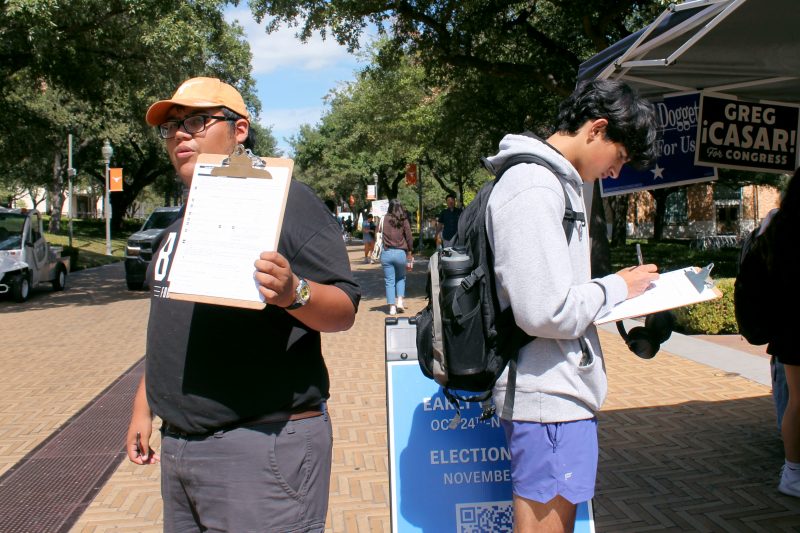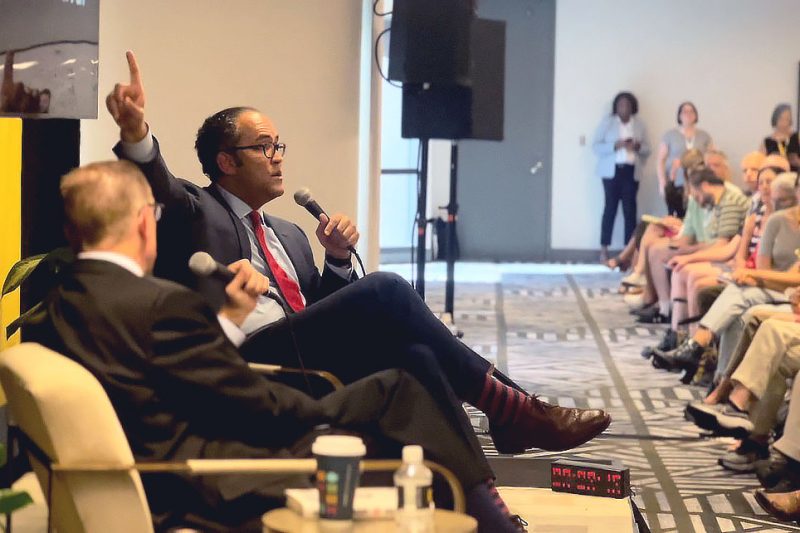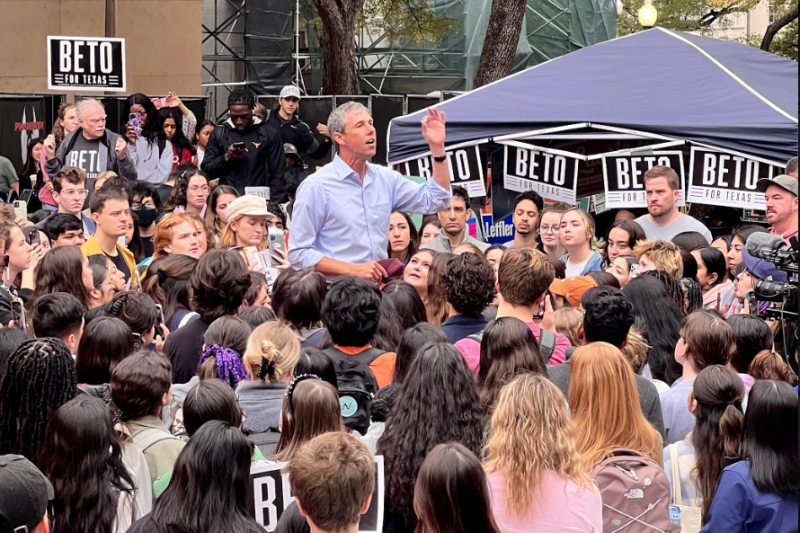Issues, Voting Challenges Made Midterms Personal for Highly Engaged Students
By Katie Pratt and Lisette Lopez
Reporting Texas

Government junior Brian Peña registers students to vote on Speedway on the last day of voter registration.
On the West Mall of the sprawling University of Texas campus on this gray, drizzly November Election Day, an eagerness for change was evident as the end of a tumultuous year filled with issues deeply affecting them beckoned students to the polls.
Weeks before, on the other side of campus, a glimpse down Speedway confirmed the UT Austin community was overwhelmingly left-leaning. There was little doubt these young people planned to vote blue.
Scenes such as these provided a warmth and excitement for Democratic voters while conservatives were left out in the cold – by classmates and their candidates alike.
“It’s not often that I’m in a position where everyone is so enthusiastic about voting for a politician,” sociology and Plan II sophomore Sofia Albini said at a rally for Beto O’Rourke, the Democrat candidate for Texas governor, on Oct. 28. “Being in this position where everyone is so excited is really uplifting.”
Not so much for McKennon Rice, economics senior and executive board member for Young Conservatives of Texas.
“I just feel like I don’t have the space to share my voice,” Rice said. “We’re already a minority, and there’s an even smaller minority that’s actually willing to talk and be open without fear.”
Young voters across a divided nation are being credited by political analysts for preventing a Republican-dominated midterm from coming to life. Yet, that “red wave” did come to shore in the Lone Star State. Every statewide Republican candidate won by double percentage points, and a frustration from the large majority of UT students the day after the election was palpable.
“I think there’s always going to be a hint of disappointment, especially when you have strong political views and it doesn’t turn out the way you hoped,” public relations senior Emma Brinsden said.
For the first eight weeks of the semester, student organizations urged their peers to register to vote before the Oct. 11 deadline and strengthen youth turnout which historically has been the lowest of any age group.
Raikolf Lopez, government and sociology senior and president of University Democrats, said the number of voter registrations largely increased throughout the fall semester, a mark of growing civic engagement.
“Last semester and the semester before that, we would register around this time about 15 people on a daily basis.” Lopez said. “Now we are registering anywhere from 70 to 100 every day. People are more excited when they come to the table, they ask more questions.”
Partisan groups like the University Democrats promoted civic engagement, along with their own goal to turn Texas blue.
“We’ve been raised with this idea that Texas is a red state and there’s nothing we can do, that our blue vote doesn’t matter,” Brian Peña, government junior and treasurer for University Democrats, said. “When people, especially students, hear (that) over and over, it really does internalize with them. We’re out here to convince them otherwise.”
Democrats have not held statewide office in Texas since the ’90s when then-Attorney General Dan Morales left office in January 1999. Democrats have not sat in the governor’s office since Ann Richards left in January 1995 after being defeated by George W. Bush, meaning college students in Texas have grown up in a deeply red political environment.
Students like Peña hoped this year would change the narrative.
“We’re one of the most underrepresented groups when it comes to voting,” Peña said. “We’re working as hard as we possibly can to get people registered. Even one of our candidates winning means an incredible amount of difference in the state.”
Turning Texas blue, while certainly important to Democrats, likely was not a driving force for young voters looking to cast a ballot.
Former U.S Rep. Will Hurd, said in an interview with Reporting Texas that young voters have historically not been engaged by candidates on issues they care about.
Hurd, a Republican who represented the 23rd congressional district that stretches from the West Side of San Antonio to El Paso, made a name for himself along with O’Rourke when they traveled together from West Texas to Washington in 2017 hoping to show the country an example of bipartisanship.
“Why do people not talk to young voters? Because they’re not voting, there’s nothing out there for you (students) to vote for,” Hurd said in late September when potential turnout among young voters was unclear. Hurd, who at the Texas Tribune Festival said he would not rule out running for the presidency, said young voters should be engaged “for the future of democracy.”
Although they were not directly on the ballot, many young voters felt the issues that punctuated the news of 2022 were at play in Texas, and it roused them to the polls, according to student interviews. The biggest one being the U.S. Supreme Court decision in Dobbs v. Jackson Women’s Health Organization, which overturned a woman’s right to legally obtain an abortion.
Not far behind, was the massacre in May of 19 students and two teachers at Robb Elementary School, just two hours southwest of Austin in Uvalde, Texas. Also on students’ minds was the growing cost of rent and groceries due to a rise in inflation. Hovering over all that was a growing fear of democracy’s demise, prompted by the January 6 insurrection on the U.S. Capitol.
“I am a black woman in Texas. All of my voting is influenced by my identity, the identity of my family and community,” Plan II sophomore Campbell Williams said. “Every election that comes around is more than just an election to me. It’s an opportunity to get my rights back and maintain those rights.”
Ryan Stromberg, government junior and president of College Republicans at Texas, said his concerns about the economy would take him to the polls.
“I went grocery shopping the other day, but I didn’t buy much. And a lot of UT students are concerned about things like getting a job after college, paying for groceries the next week, making rent. I think those are more pressing issues students are facing,” Stromberg said. “Inflation and the way the economy is right now needs to change.”
For Albini, a member of University Democrats and student intern for Austin City Council candidate Zohaib Qadri, the overturning of Roe v. Wade was her largest concern in the election. She said it wasn’t just legal abortion that was threatened, she feared certain politicians in Texas, if elected again, would take away other rights.
“This could mean losing contraceptives, for me it means a loss of my privacy,” Albini said. “With everything going on right now, my rights are at stake, my friends’ rights are at stake. It’s a huge driver for me.”
Spencer Diaz, a rhetoric and writing junior, did not consider himself politically engaged, but found voting rights and diversity important in the midterms. Diaz, a person with autism whose father is from Mexico, hoped the election would bring change for Texans of all stripes.
“I would love to see a little more awareness of the fact that everyone is a human being, of any race, of any ethnicity, of any sexuality,” Diaz said. “I think the current government in Texas doesn’t see individuals, they see groups. I’m part of a group they choose to ignore.”
But the issues at play needed an advocate on the ballot.
Travis County Judge Andy Brown, a Democrat who won his re-election, said a key to getting young voters to the ballot box was engagement from candidates.
“There could not be more important reasons (to vote), especially for students, in this election,” Brown said in an interview with Reporting Texas.
O’Rourke was one candidate who put in the time and effort to reach college students. He visited the UT campus twice during tours of universities in Texas.
At an Oct. 28 rally, some 100 yards away from the Flawn Academic Center where early voting was picking up after earlier numbers were disappointing to Democratic operatives, students carrying backpacks crammed to hear O’Rourke speak. The crowd had the familiar buzz of a student section at a Texas Longhorn football game.
O’Rourke, his voice hoarse from weeks of campaigning, spoke of reproductive freedom, the elementary school shooting in Uvalde and the legalization of cannabis – topics the young voters surrounding him cared about the most.
“You all make me so hopeful, you give me optimism in a time where we so desperately need it,” O’Rourke said.
Matthew McCoy, government and urban studies junior from Mansfield, Texas, said he became a registered student fellow with the Beto For Texas campaign to see change in the state.
“Everything we’ve seen in Texas these past few years has been under Republican control,” McCoy said a few days before O’Rourke’s visit to the West Mall. “Beto is standing up, he’s confronting Greg Abbott on all the issues Texans are facing right now.”
The talk of Texas at that point, a week before Election Day, was about numbers – and disappointment among the excited. Early voting totals reported daily in Houston’s Harris County, Austin’s Travis County and in the Dallas-Fort Worth metroplex, were below projections. Poll results in the gubernatorial race fluctuated almost daily, making the accuracy of polling yet another issue.
“I think seeing numbers that say ‘your candidate’s down’ is certainly demotivating,” McCoy said. “It makes people think their vote won’t matter, especially here in Texas, a state that’s been red for decades now.”
Republican Gov. Greg Abbott would go on to defeat O’Rourke by over 11 points, a decisive victory that was called a little over two hours after polls closed across the state.
Despite their ultimate success, the conservative student presence on campus was no rival for Democrats who dominated campaigning and registering students to vote. Right-leaning student groups were occasionally visible on Speedway or on the West Mall.
“I don’t think the conservative student body is as prominent at UT,” Albini said. “But they’ve definitely been doing their part as well.”
Democratic efforts on campuses across Texas got all the buzz while student conservatives may well have been what former President Richard Nixon famously called “the silent majority.”
Rice said the disparity in engagement was due to the general feeling that conservative students are unwelcome on campus.
“UT is much more a liberal school than conservative, so it’s easier (for liberals) to have that confidence in your beliefs because people are going to agree with you and support you,” Rice said.
Rice and fellow members of the Young Conservatives of Texas stood outside the Flawn Academic Center on Election Day campaigning for Austin mayoral candidate Jennifer Virden, a conservative tax relief candidate who finished third in her race. They said if they had been supporting a candidate like Abbott, they most likely would be judged in a harsher light by students passing by.
Republican candidates did make visits to the UT campus, but never in as publicized a manner as O’Rourke. Abbott’s most recent interaction with UT students was in October 2021, when he sat down for a closed interview at Darrell K. Royal Memorial Stadium to discuss banning COVID-19 vaccine mandates.
“Abbott isn’t going to spend his time at this campus where people are going to protest or be a danger to him,” Rice said. “It’s not like he doesn’t care about college students, but his time is best spent somewhere that likes him. It’s just strategy.”
No matter the issues to rally behind or engagement from candidates, the odds were stacked against college students to get out and vote. State election laws restricting same-day voter registration and accessibility to absentee ballots, a logistically confusing process of registering to vote and actually voting, and long lines at polling places were all deterrents for young voters.
After Travis County moved one on-campus polling location from the Perry-Casteñeda Library to the distanced LBJ School of Public Affairs, Plan II sophomore Elise De La Fuente testified in front of the Travis County Commissioner’s Court to increase polling locations near campus.
“Voting on a college campus is already difficult as it is. A lot of students do not have the knowledge or are equipped with the things they need to vote,” De La Fuente said. “Not all students are interested in voting, and moving a polling location that was so central to campus makes the issue even worse.”
On Election Day, lines to vote at the Flawn Academic Center, the polling location closest to the heart of campus, reached upwards of two hours. There, volunteers gave out pizza and snacks to encourage students to stay in line while poll workers reminded those waiting about other polling locations with shorter lines.
“I’ve been in line for 40 minutes,” linguistics and neuroscience junior Venus Shirazy said while in line to vote. “I’m technically missing class, but it’s a good excuse. I’ll be in line until I get to vote, it’s too late to back out now.”
Apathy and logistical roadblocks may have gained the upper hand in the end. In Travis County voting precincts 203-204 and 310-315, covering the UT campus and West and North Campus, over 15,000 ballots were cast, about 30% of the UT undergraduate and graduate population. Although these precincts represent the majority of areas where UT students live, they include voters outside the student body and omit students who voted elsewhere.
Still, Albini said that despite numbers of young voters being unsatisfactory statewide, there was much for them to be proud of.
“I think that the engagement of UT students was very high, for local and state elections. I am proud of my peers for trying their hardest, waiting in lines as long as two hours, and doing what it took to fulfill their civic duty,” Albini said.
“Since 2016, the entire dynamic of politics has changed. It’s gone from something your parents put on TV talking about infrastructure and money, things you don’t really understand. Now we see really personal things on the ballot, it really hits home with our age group.”
Diaz offered another take.
“Everyone is living their own lives, but we’re more than aware (of politics),” Diaz said. “The question I ask myself is, ‘What are we willing to do for change if we really want it at all.”

